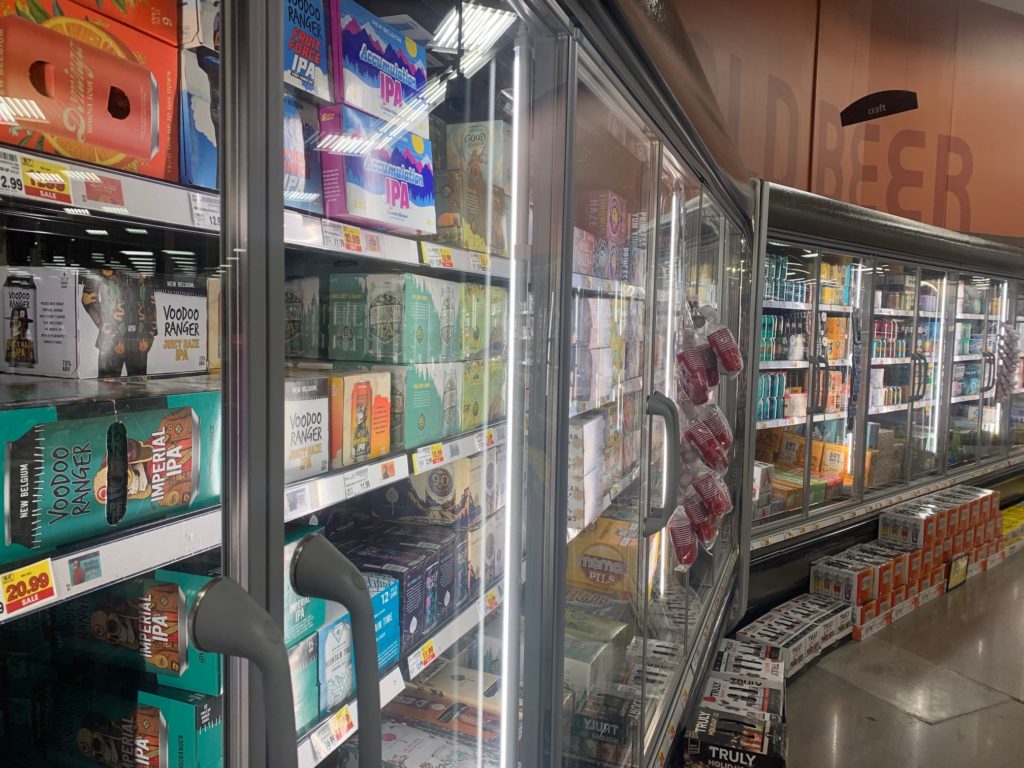
Despite concerns from some industry leaders, a recent Colorado State University study found that since the state began allowing the sale of full-strength beer in grocery stores in 2019, there has been minimal harm to the craft beer industry and a limited impact on liquor stores.
But with the state poised to allow the sale of wine in grocery stores on March 1, CSU researchers say liquor stores could see less foot traffic and be forced to specialize in more niche products in order to survive – something that could create new opportunities for smaller Colorado craft brewers who have had difficulties securing space on grocery store shelves.
“After Colorado approved beer in grocery stores, there was a 5% decrease in foot traffic in liquor stores – which all things considered, wasn’t gigantic,” said Marco Costanigro, a professor of agricultural and resource economics at CSU and one of the study’s co-authors. “But when we add wine to the equation, I expect that more marginal liquor store businesses will have a harder time.”
The sale of full-strength beer – or beer containing more than 3.2% alcohol by volume – in grocery stores mainly benefitted larger craft breweries and macro-brands, according to the study.
However, growth of regional craft brands was counterbalanced by a decline in liquor store sales – which Costanigro said was more pronounced in rural markets where consumers tend to buy beer from national rather than regional brands.

“Beer sales in grocery and convenience stores: a glass half-full for craft brewers?”
Nathan Palardy1, Marco Costanigro2, Joseph Cannon3, Dawn Thilmany2 , Joshua Berning2, Jude Bayham2 and Jeff Callaway4
Regional Studies
1 University of Florida Institute of Food and Agricultural Sciences
2 Colorado State University College of Agricultural Sciences
3 Colorado State University College of Business
4 Colorado State University College of Health and Human Sciences
Small breweries, meanwhile, encountered numerous barriers to getting on grocery store shelves, including costly insurance requirements and requests to distribute to a minimum number of stores, which created logistical barriers that many of these small businesses weren’t equipped to handle.
“Consequently, it became easier for these smaller breweries to work with smaller liquor stores that had fewer logistical challenges to get through in terms of distribution,” said study co-author Joe Cannon, a professor of marketing at CSU.
To collect data for the study, researchers surveyed 76 Colorado craft breweries on total production, packaging practices, distribution strategies and volume sold by market channel in 2017 and in late 2019 (one year after full-strength beer became available in grocery stores). Thus, the study’s data does not include the impacts of the COVID-19 pandemic, which initially led to record sales at liquor stores across the state.
Researchers also utilized cell phone tracking data to analyze liquor store foot traffic.
They found that:
- The total volume of craft beer in liquor stores declined by 17,000 barrels (16%), while the volume sold in grocery stores grew by 28,000 barrels.
- Half of Colorado’s craft breweries reported having access to distribution in grocery stores, but it only accounted for 5% of their sales by volume.
- Regional breweries saw a 19% increase in beer sales in grocery stores (25,000 barrels), but their sales in liquor stores contracted by the same amount.
- Cellphone data showed a roughly 5% decline in foot traffic to liquor stores, but there’s no evidence this corresponded with sales.
“I think the sale of wine in grocery stores will further erode the share of liquor store sales that happen in liquor stores,” Cannon said. “However, we’ve seen some smaller liquor stores respond by stocking a greater variety of craft beer, which in turn helps those small brewers.”
The researchers also said that the sale of beer in grocery stores holds benefits for consumers in terms of lowering prices and greater convenience, and that adding wine to the equation could be a further boon for increased competition.
“Things change all the time – and the liquor industry is no exception,” Costanigro said. “These changes do create winners and losers, and that’s why it’s important for businesses to adapt.”
The full study is available at col.st/UtJ3u.
REDI Report compares data from multiple states
While a national trend toward expanding beer and wine sales to grocery and convenience stores does have a substantial impact on liquor store sales, it is not the catastrophic one some feared, according to a recent study by CSU’s Regional Economic Development Institute (REDI).
The REDI Report compared data from Colorado, Kansas and Oklahoma – all of which had introduced expanded beer sales — or beer and wine sales in the case of Oklahoma — in 2017 and 2018. The report was co-authored by Nathan Palardy, a former graduate research assistant in the College of Agricultural Sciences’ Department of Agricultural and Resource Economics, now an assistant professor of policy at the University of Florida, and Costanigro.
Among their findings:
- The introduction of alcohol into grocery and convenience stores in Oklahoma, Colorado and Kansas led to a substantial decline overall in statewide monthly liquor store visitation (2.9% to 6.8%).
- The expansion of beer sales specifically decreased monthly visitation at rural liquor stores in Colorado (5%) and Kansas (7.9%) but had negligible effect on urban liquor stores.
- The expansion of both beer and wine in Oklahoma decreased monthly visitation at both rural (9%) and urban (7%) liquor stores.
Using geolocated cell phone tracking data from January 2017 to February 2020, including the location of liquor stores and monthly foot traffic, the researchers compared visitation before and after the policy change.
They concluded that there is no support to claims from trade associations that allowing beer sales to expand into new market channels results in the shuttering of many small mom-and-pop liquor stores. However, the introduction of wine and beer into grocery stores has larger and more widespread impacts, affecting both rural and urban stores. Policy makers looking at similar legislation should carefully weigh the benefits to consumers of one-stop shopping convenience against the decline in revenue for small businesses.
Visit www.csuredi.org for the full report.
The College of Business at Colorado State University is focused on using business to create a better world.
As an AACSB-accredited business school, the College is among the top five percent of business colleges worldwide, providing programs and career support services to more than 2,500 undergraduate and 1,300 graduate students. Faculty help students across our top-ranked on-campus and online programs develop the knowledge, skills and values to navigate a rapidly evolving business world and address global challenges with sustainable business solutions. Our students are known for their creativity, work ethic and resilience—resulting in an undergraduate job offer and placement rate of over 90% within 90 days of graduation.
The College’s highly ranked programs include its Online MBA, which has been recognized as the No. 1 program in Colorado for five years running by U.S. News and World Report and achieved No. 16 for employability worldwide from QS Quacquarelli Symonds. The College’s Impact MBA is also ranked by Corporate Knights as a Top 20 “Better World MBA” worldwide.